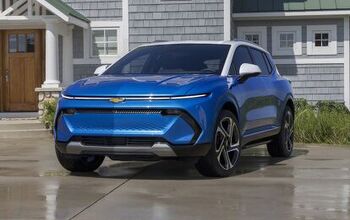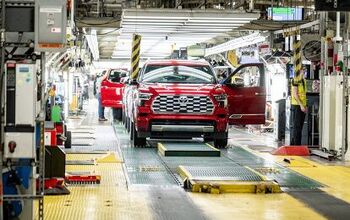Where Are Those DOE Retooling Loans Anyway?
With a mere $9b awarded so far, the Department of Energy’s Advanced Technology Vehicle Manufacturing Loan program is a long way from fulfilling its $25b promise to fund a turnaround in America’s green auto sector. So far, Ford has received $5.9b for a wide range of retooling projects (not a bailout, per Ford PR), Nissan has received $1.6b for Leaf production in Smyrna, TN, while startups Tesla and Fisker have received $465m and $529m respectively. According to the Detroit News, the rest of the 100-odd applicants for the $25b pool are stuck waiting, and with about $42b in total pending requests, not everyone is going to get a rose from the Feds. Predictably, the whining has begun.
Michigan Senator Debbie Stabenow tells the DetN:
I hope to see the remaining funding allocated as soon as possible. Retooling our plants prevents plant closures and saves Michigan jobs
Plus, it keeps the bailout babies alive a little longer. After all, GM said last Summer that it was “counting on” its $10b chunk of the DOE handout. So what’s the holdup? Like the bailout, “financial viability” is a requirement for the loan program, and the DOE still isn’t convinced GM or Chrysler make the cut. Nor could they be convinced: GM still has yet to release “fresh start” accounting results, having only given out non-GAAP-approved results. GM spokesfolks say that the $10b will hit its bank accounts when new financial results come out next month. Too bad it will also hurt The General’s whole “we’re paying back taxpayers” PR narrative. For its part, Chrysler says it is “optimistic it will win approval [of its $8.55b request] this year.”But if we’re to believe that GM and Chrysler will both have their requests fully funded, there isn’t going to be much left for the other 90 or so applicants. And as with the bailout, suppliers are the first to be left behind. A number of suppliers including Delphi Corp., Lear Corp., Metaldyne, BorgWarner, Federal Mogul, ArvinMeritor and Continental AG’s U.S. unit have collectively sought about $1b, but have already given up. Motor & Equipment Manufacturers Association government affairs VP Ann Wilson, says the trade group is bummed about the DOE’s “inability to award these loans to the supplier industry.”Meanwhile, BNet reports that the secretive (and vapor-y) Louisiana firm V-Vehicle has been turned down, and cop car firm Carbon Motors is looking like it will be left behind. Though Carbon r aised some eyebrows by securing BMW engines for its purpose-built patrol cars, its entire business plan appears to be contingent on a $310m ATVML loan. As BNet’s Jim Motavelli points out, Carbon’s foreign-sourced engines and Detroit competition seem to doom the prospect of a Carbon loan.With Detroit poised to gobble up the rest of the DOE’s loans, the little guys are lashing out. According to XP Vehicles founder Scott Redmond, “only Detroit companies or people connected to big companies or venture capital” have a chance at the loans. And though his thesis has proven true so far, and though the Feds have every incentive to keep funneling cash into Detroit’s zombies, it’s important to not romanticize the alternatives too much. Even with GM’s tragic history, The General seems to be a marginally safer investment than firms like XP Vehicles, Th!nk, or motorcycle/3-wheeler firms like Aptera and Brammo. After all, the ATVML program already has longshots in its portfolio, in the form of Tesla and Fisker. That having been said, Chrysler’s on-again-off-again alt-energy programs (not to mention its general underperformance and poor odds of survival) make it a longshot itself.It’s ironic that we’re nearly at the one-year anniversary of the auto bailout, and the topic of TTAC’s first-ever Bailout Watch is still less than half-spent. At the time we assumed that Detroit would be the main beneficiary, with the possibility of a few hand-selected little guys joining the fun. That the government should continue to sink cash into Detroit is tough to argue at this point, as it can only help the firms IPO sooner, bringing the national experiment with automaker owner to a long-overdue close. Especially considering that the ATVML is ostensibly a loan program, which will eventually need to be repaid. The issue of whether favoring Detroit at the expense of the nation’s EV startups stifles innovation or makes sound financial sense is a the bigger question. And it’s too bad that a healthy debate on that topic won’t actually change the outcome.More by Edward Niedermeyer
Latest Car Reviews
Read moreLatest Product Reviews
Read moreRecent Comments
- Kjhkjlhkjhkljh kljhjkhjklhkjh A prelude is a bad idea. There is already Acura with all the weird sport trims. This will not make back it's R&D money.
- Analoggrotto I don't see a red car here, how blazing stupid are you people?
- Redapple2 Love the wheels
- Redapple2 Good luck to them. They used to make great cars. 510. 240Z, Sentra SE-R. Maxima. Frontier.
- Joe65688619 Under Ghosn they went through the same short-term bottom-line thinking that GM did in the 80s/90s, and they have not recovered say, to their heyday in the 50s and 60s in terms of market share and innovation. Poor design decisions (a CVT in their front-wheel drive "4-Door Sports Car", model overlap in a poorly performing segment (they never needed the Altima AND the Maxima...what they needed was one vehicle with different drivetrain, including hybrid, to compete with the Accord/Camry, and decontenting their vehicles: My 2012 QX56 (I know, not a Nissan, but the same holds for the Armada) had power rear windows in the cargo area that could vent, a glass hatch on the back door that could be opened separate from the whole liftgate (in such a tall vehicle, kinda essential if you have it in a garage and want to load the trunk without having to open the garage door to make room for the lift gate), a nice driver's side folding armrest, and a few other quality-of-life details absent from my 2018 QX80. In a competitive market this attention to detai is can be the differentiator that sell cars. Now they are caught in the middle of the market, competing more with Hyundai and Kia and selling discounted vehicles near the same price points, but losing money on them. They invested also invested a lot in niche platforms. The Leaf was one of the first full EVs, but never really evolved. They misjudged the market - luxury EVs are selling, small budget models not so much. Variable compression engines offering little in terms of real-world power or tech, let a lot of complexity that is leading to higher failure rates. Aside from the Z and GT-R (low volume models), not much forced induction (whether your a fan or not, look at what Honda did with the CR-V and Acura RDX - same chassis, slap a turbo on it, make it nicer inside, and now you can sell it as a semi-premium brand with higher markup). That said, I do believe they retain the technical and engineering capability to do far better. About time management realized they need to make smarter investments and understand their markets better.


































Comments
Join the conversation
What exactly has Ford retooled?
Jeez a simple google search will show you a few: Ky Truck $200m Windsor Engine $736m Cleveland Engine #1 $155m Mi Truck $550m